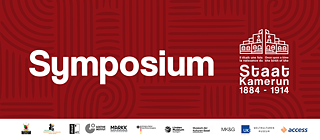|
9:00 AM-5:00 PM
Symposium ‘Once upon a time, the birth of Staat Kamerun 1884-1914’.
Symposium|Come and explore and debate the links between memory, artistic creation and historical heritage.
-
National Museum /Musée National
- Language English, French
- Price Free

Presented by the Musée National, doual'art and the Goethe-Institut, ‘Il était une fois la naissance du Staat Kamerun 1884-1914’ explores the historical landscape of Cameroon under German colonial rule, showing the profound cultural and social upheavals imposed during those thirty years. The exhibition traces the colonial borders that once separated diverse peoples and traditions, marking the birth of Cameroon as an administrative state. It confronts the forced submission to colonial norms, which disrupted ancestral customs and social and spiritual ties, and led to a lasting identity crisis.
With this in mind, beyond the exhibition, conversations and discussions are taking shape through a symposium.The symposium, to be held from 19 to 21 February 2025 at the Musée National, will address 3 fundamental issues:
- The restitution and return of objects and archives held in foreign institutions but also present and disseminated in Cameroon. What is the place of the object in the Cameroonians' quest for identity? What kind of quest are we talking about: the pride of recovering a lost object as a trophy? The quest to re-establish a spirituality inherent in the object? What role can the object produced in a past century play in the 21st century? Does the object have to return permanently, or can it return virtually or temporarily, which implies different cooperation procedures?
- The history of Cameroon under German domination, knowledge of the subject or reminiscence. Is it a heritage shared by all Cameroonians? Is it experienced as a perversion of the original customs? Is it seen as inescapable (like all other Western colonisations at the time), but an opportunity to reinvent oneself?
- Contemporary art, whatever its field (literature, visual arts, etc.), is a bridge between the real and the imaginary. Can it mediate between the tangible (objects, historical facts) and free thought? Is it a factor in rereading, understanding, questioning and projecting?
With this in mind, beyond the exhibition, conversations and discussions are taking shape through a symposium.The symposium, to be held from 19 to 21 February 2025 at the Musée National, will address 3 fundamental issues:
- The restitution and return of objects and archives held in foreign institutions but also present and disseminated in Cameroon. What is the place of the object in the Cameroonians' quest for identity? What kind of quest are we talking about: the pride of recovering a lost object as a trophy? The quest to re-establish a spirituality inherent in the object? What role can the object produced in a past century play in the 21st century? Does the object have to return permanently, or can it return virtually or temporarily, which implies different cooperation procedures?
- The history of Cameroon under German domination, knowledge of the subject or reminiscence. Is it a heritage shared by all Cameroonians? Is it experienced as a perversion of the original customs? Is it seen as inescapable (like all other Western colonisations at the time), but an opportunity to reinvent oneself?
- Contemporary art, whatever its field (literature, visual arts, etc.), is a bridge between the real and the imaginary. Can it mediate between the tangible (objects, historical facts) and free thought? Is it a factor in rereading, understanding, questioning and projecting?
Location
National Museum /Musée National